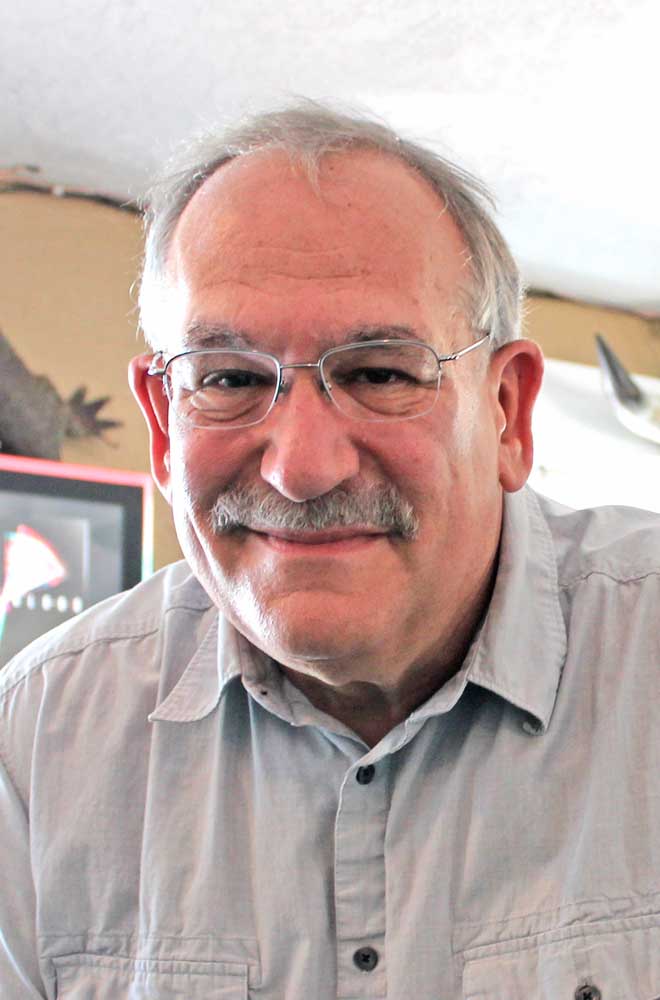Mediator urges, ‘Get wise with Solomon’
Published 2:08 pm Monday, August 23, 2021

- ‘In the last 10 years, our culture across the world has been devolving.’ — Ira Kitmacher, retired mediator
OCEAN PARK — It might take the wisdom of Solomon to heal the nation.
Ira Kitmacher wants to play his part.
The Ocean Park author is busy promoting his book of Northwest ghost stories, published in July.
For more about Ira Kitmacher’s ghost book, “Haunted Graveyard of the Pacific,” log on to tinyurl.com/Ghost-Book-Details.
But already he is embarked on his next project — revising a “how-to” book he wrote several years ago offering Biblical insights to solve modern disputes.
Kitmacher, 60, is a retired attorney who held high-level positions in human resources with the federal government and is called as an expert witness in cases involving labor laws. He has taught classes in the Bay Area, Portland State University and at the University of Georgetown as well as virtually in the bachelor’s in organizational management degree program at Grays Harbor College in Aberdeen.
When he and wife Wendy, a U.S. Department of Labor executive, retired to Ocean Park a few years ago, he felt he had time to delve into his passion —writing. His work draws on skills honed in his professions. “I enjoy doing research and organizing information,” he says.
The result is “Haunted Graveyard of the Pacific,” a 144-page road trip that takes the reader from Tillamook to British Columbia, via Cannon Beach, Astoria and Long Beach, examining spooky legends.
Kitmacher admits he is a ghost skeptic. “I am not a full believer, but I am fascinated by stories,” he says. “I have a love of history and hauntings.”
However, he points to inventor Thomas Edison’s quote, “It’s obvious that we don’t know one millionth of one percent about anything.”
The book took more than 18 months of research, reflected in five pages of source notes. He eschewed Northwest writers who had trod that path. “I purposely didn’t read local authors — I didn’t want to be influenced by them.”
Next creative endeavor
Now that’s available, he is working to revise “Solomon’s Steps: Unlock Ancient, Biblical Wisdom — Resolve Life’s Conflicts.”
That book is an examination of how insights contained in Bible passages can be applied to mediation in marital, neighbor or other disputes.
It highlights Solomon, son of David, who the Book of Kings claims wrote 3,000 proverbs. He was memorable for forcing a conclusion to a dispute between two mothers over the “ownership” of a baby by suggesting the child be cut in half.
Kitmacher began research in 2004 and eventually self-published in 2010.
“It relied heavily on King Solomon, but I tried to broaden it by quoting Jewish heroes, Jesus, Mohammad, Gandhi,” he says. “My target audience was everyone who might have an interest in A, resolving conflicts and B, an underlying belief in the Golden Rule, ‘Do unto others as you would they do unto you.’ It was not seeking a religious audience necessarily.”
Six-point plan
When highlighting ways to solve conflict, he notes that barriers include anger or being too invested in one position. He outlines a six-point strategy which he developed as a mediator:
1. Bridge: build an atmosphere of mutually respectful behavior;
2. Defuse: engage in conflict reducing communication;
3. Make peace: apply diplomacy and wisdom;
4. Negotiate: seek a mutually beneficial solution;
5. Collaborate: achieve lasting and beneficial agreement and trust;
6. Know: when and from whom to seek help.
Chapters suggest ways to follow this strategy using examples from the workplace, marital disputes and even neighbors arguing over the size and style of a fence.
Kitmacher says he was surprised and delighted that later research led him to discover that there had been six steps up to Solomon’s Temple in Jerusalem.
Civility is key
His impetus for taking a fresh look at the book is today’s fractured world, where conflicts are exacerbated by wider access to publishing platforms.
“In the last 10 years, our culture across the world has been devolving,” he says. “We have conflict. The perfect example is this country.”
While updating, Kitmacher says he may change the title or reinforce a theme of “Practicing Civility in Uncivil Times.”
At the core of his passion for resolving conflict is a reverence for the memory of his Polish father, Albert, who was the only member of his Jewish family to survive the World War II Nazi death camps.
As a historian, Kitmacher worries that studies of the conditions that led to Hitler’s “Final Solution” offer ominous warnings for today’s troubled society. “History has a habit of repeating itself,” he says.
Albert Kitmacher, a tailor who spoke no English, emigrated to the United States in 1947, worked multiple jobs and married Pearl, who had learned of the atrocities against her fellow Jews and enlisted in the U.S. Navy as a WAVE (Women Accepted for Volunteer Emergency Service). They lived in Massachusetts and raised four children, encouraging all toward advanced education.
Conflict management
In his conflict-resolution book, Kitmacher is blunt when describing his motives for writing it.
“There has always been a sense in my family of ‘why did the Holocaust happen?’ and ‘How can we keep it from happening again?’” he writes.
“All wars and interpersonal difficulties have one thing in common: conflict. Some conflicts are fought with words, some with guns.
“It is very difficult to resolve age-old hatreds between peoples. It is somewhat easier to resolve the everyday conflicts we each have in our lives. By resolving everyday conflicts, we have a better chance of improving our individual lives and positively impacting the larger conflicts in which they exist.”
Make full use of our ‘Two ears’
“It would be wonderful if we could resolve our disputes,” he says in an interview. Respect and tone are important, he notes. As an example, his “Solomon” book contains two examples of an email. A polite request for a quick reply, addressed to a named person and signed with the sender’s name, contrasts with exactly the same words printed in bold capitals without using any names.
“In capital letters, we screaming at each other,” Kitmacher says.
“I think tone is critical,” he adds. “Where people respect each other, they can diffuse the conflict.”
His book quotes the Greek Stoic philosopher Epictetus: “We have one tongue and two ears, so we should do twice as much listening as talking.”
Documenting ‘miracles’
Not content with one book just published and an earlier one being revised, Kitmacher is working on two others. He plans a second regional ghost book and has a deadline looming. And his thoughts are on a family history highlighting what he describes as “miracles” or “close scrapes,” including his father’s apparently prescient dreams which helped him survive the Warsaw Ghetto, forced labor in a salt mine, and numerous Nazi work camps including Majdanek, a few miles north of Auschwitz. One such prompted him, despite feeling weak, to join a labor team going outside his camp, returning to learn all those who had stayed behind in his hut were killed.
On the horizon is a trip for Kitmacher and his wife to Europe to retrace the footsteps of his father, who died in 2000. “Not to relive the pain, but get a better sense of own family history,” he says.
In summing up his latest efforts, Kitmacher offers the much-paraphrased quote attributed to Benjamin Franklin, “If you want to be remembered, either do something or write something.”
“I am enjoying the writing process,” he says. “I can’t paint, I can’t draw. This is my way to communicate.”









